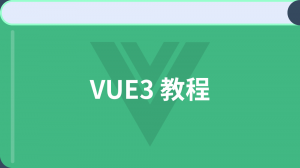阅读(3483)
赞(15)
Vue 3.0 key attribute
2021-03-09 15:52:37 更新
#概览
- 新增:对于
v-if/v-else/v-else-if的各分支项key将不再是必须的,因为现在 Vue 会自动生成唯一的key。
- 非兼容:如果你手动提供
key,那么每个分支必须使用唯一的key。你不能通过故意使用相同的key来强制重用分支。
- 非兼容:
<template v-for>的key应该设置在<template>标签上 (而不是设置在它的子节点上)。
#背景
特殊的 key attribute 被用于提示 Vue 的虚拟 DOM 算法来保持对节点身份的持续跟踪。这样 Vue 可以知道何时能够重用和修补现有节点,以及何时需要对它们重新排序或重新创建。关于其它更多信息,可以查看以下章节:
#在条件分支中
Vue 2.x 建议在 v-if/v-else/v-else-if 的分支中使用 key。
<!-- Vue 2.x -->
<div v-if="condition" key="yes">Yes</div>
<div v-else key="no">No</div>
这个示例在 Vue 3.x 中仍能正常工作。但是我们不再建议在 v-if/v-else/v-else-if 的分支中继续使用 key attribute,因为没有为条件分支提供 key 时,也会自动生成唯一的 key。
<!-- Vue 3.x -->
<div v-if="condition">Yes</div>
<div v-else>No</div>
非兼容变更体现在如果你手动提供了 key,那么每个分支都必须使用一个唯一的 key。因此大多数情况下都不需要设置这些 key。
<!-- Vue 2.x -->
<div v-if="condition" key="a">Yes</div>
<div v-else key="a">No</div>
<!-- Vue 3.x (recommended solution: remove keys) -->
<div v-if="condition">Yes</div>
<div v-else>No</div>
<!-- Vue 3.x (alternate solution: make sure the keys are always unique) -->
<div v-if="condition" key="a">Yes</div>
<div v-else key="b">No</div>#结合 <template v-for>
在 Vue 2.x 中 <template> 标签不能拥有 key。不过你可以为其每个子节点分别设置 key。
<!-- Vue 2.x -->
<template v-for="item in list">
<div :key="item.id">...</div>
<span :key="item.id">...</span>
</template>
在 Vue 3.x 中 key 则应该被设置在 <template> 标签上。
<!-- Vue 3.x -->
<template v-for="item in list" :key="item.id">
<div>...</div>
<span>...</span>
</template>
类似地,当使用 <template v-for> 时存在使用 v-if 的子节点,key 应改为设置在 <template> 标签上。
<!-- Vue 2.x -->
<template v-for="item in list">
<div v-if="item.isVisible" :key="item.id">...</div>
<span v-else :key="item.id">...</span>
</template>
<!-- Vue 3.x -->
<template v-for="item in list" :key="item.id">
<div v-if="item.isVisible">...</div>
<span v-else>...</span>
</template>
